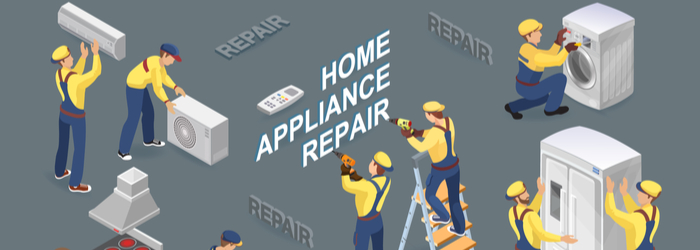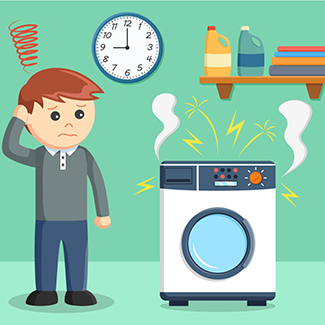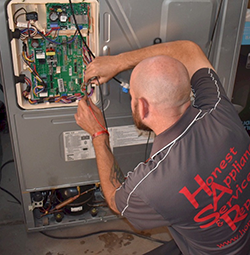Underperforming Appliances May Only Need A Simple Adjustment
 01 December 2020
01 December 2020 

Underperforming Appliances May Only Need A Simple Adjustment
So, your washing machine or dishwasher doesn't work as well as it did years ago. Don't run out to buy a new one so quickly. You just may not be allowing the machine to run as designed, using the wrong amount of detergent, or have hard water. All three could be the issue, too. Anthony Chavez, owner of Honest Appliance Service & Repair (HASSAR), a Rosie-certified partner explains.
Appliance Industry Changes & Cleaning Products
The National Appliance Energy Conservation Act of 1987 established minimum efficiency standards for many common household appliances. In the last 15 years, mandates have been placed on appliance manufacturers to produce more energy-efficient appliances while cutting back on water usage for dishwashers and washing machines. To meet these mandates, the manufacturers must be creative in engineering a dishwasher that uses significantly less water and still cleans dishes well.

"It took years for the industry to figure out what happened and how to deal with it. This issue continues to evolve," said Anthony.
The UL Sticker
You have probably seen the UL sticker on appliances. It stands for Underwriters' Laboratories, Inc. The UL certification process is required for many products sold in the United States. The UL sticker provides consumers with a guarantee that their product has been tested and approved by UL's team of technicians.
"In the last 15 years, we had to find solutions. The mandates caused consumers to notice their appliances did not work as well as they once did. In particular, they could no longer select the water level in washing machines. People chose to try adding water manually because we learned over time the water level should be higher. The problem then became clothes not tumbling properly on the wash cycle, thus a negative result on how well the washer works.
Hardwater 101
Because of Arizona's hard water, customers complain that their dishes are not getting cleaned, and call us thinking their machine is broken," Anthony remarked.
HASSAR developed 'Hardwater 101" a training for customers to get better results from their machines, eliminating the need for unnecessary repair. With the mandates to remove phosphates from cleaning products, dish detergent companies had to get creative to find solutions. The result is a citric acid powder, which is actually lemons. HASSAR recommends Lemi Shine as an additive.
Rosie recommends to always read product labels before using. In this case, Anthony warns not to assume the directions on the label is the best way to use the product. The harder the water, the more citric acid you need. Similarly, with detergents, the better the detergent, the less you need.
Because hot water dissolves the detergent, Anthony suggests using the "more heat" feature to ensure hot water. Cold water will not dissolve the detergent. You will just be washing out the detergent completely. If the water is too cold (which could happen in Northern Arizona), the detergent acts like sand and can etch glassware. "We DO NOT recommend running the hot water until it is hot. That only helps the pre-wash and the water can cool before the main wash. Hot water counts when the detergent is released during the wash cycle," he said.
Smelly Washing Machine
 Jeremy Crosby, HASSAR's laundry expert, has more than 20 years as a field technician. He explained that as the laundry soap and fabric softener biodegrades, it creates bacteria. Both can cause a sour odor in the machine and even, over time, in your clothes. Here's why...
Jeremy Crosby, HASSAR's laundry expert, has more than 20 years as a field technician. He explained that as the laundry soap and fabric softener biodegrades, it creates bacteria. Both can cause a sour odor in the machine and even, over time, in your clothes. Here's why...
Both are made from many different chemicals which are also biodegradable and over time, build up in the washer. While fabric softener helps make the clothes feel soft, when these chemicals biodegrade, they cause foul odors. Over time, these biodegradables get absorbed into clothes and leave a residue that continues to build up. You may even notice that if you use a shirt washed with fabric softener to clean your eyeglasses, it can ruin the protective coating over time making them seem foggy.
Jeremy recommends running a cleaner Affresh or Washer Magic in the washer once a month to prevent the buildup and remove the sour odor. In his experience, most people use too much laundry detergent when washing their clothes. With less water being used, customers often don't realize the wash cycle requires less soap. Today's front loaders wash by tumbling, unlike the top loaders of yesteryear that used an agitator to get the dirt out. Too much soap in the front loader creates an excess of suds which eventually cause poor wash performance.
"Too much detergent in a washer creates what I call the 'can of Coke' analogy. When you pour a can of Coke too fast, all you get is suds. Similarly, if there is too much detergent creating excess suds, there's less water to actually wash your clothes," Jeremy explained.
His recommendation for a full load of clothes is no more than half the amount instructed on the label of detergent if you have hard water, and a quarter of the amount instructed on the label if you have a soft water system. For a large load of towels, you only need 1-2 tablespoons of detergent. Like dishwasher products, the better the detergent, the better the cleaning. If you have hard water, add a cup of white vinegar to the water for a half capacity load of clothes. The vinegar will help soften the water, reducing the need for a lot of fabric softener. Just add it into the basket before loading your clothes.
What Do You Do When Your Appliance is Out For Repair?
Life goes on even when your washing machine or dishwasher is out for service. HASSAR offers loaner appliances at no cost. "If a customer turns down the repair or wants to take advantage of a manufacturer's warranty, we will rent them a loaner at a nominal fee until they get their new appliance," said Anthony.
###
Podcast
Sponsored By: Honest Appliance Service & Repair (HASSAR)
![]() About Honest Appliance Service & Repair: Established in January 2015, HASSAR is locally owned and owner-operated. Owners Anthony and Linda Chavez grew up repairing equipment. With 57 years combined in the service repair industry, they learned a lot about what works and doesn't work for customers. Treating the customer by the Platinum rule - "...do unto others as THEY would have you do unto them." HASSAR, goes beyond treating them how YOU would want to be treated and treat them the way THEY want to be treated.
About Honest Appliance Service & Repair: Established in January 2015, HASSAR is locally owned and owner-operated. Owners Anthony and Linda Chavez grew up repairing equipment. With 57 years combined in the service repair industry, they learned a lot about what works and doesn't work for customers. Treating the customer by the Platinum rule - "...do unto others as THEY would have you do unto them." HASSAR, goes beyond treating them how YOU would want to be treated and treat them the way THEY want to be treated.
###
RELATED CONTENT:
- Resource: Appliance & Equipment Standards
- Blog: Make This Weekend A DIY Weekend At Your House
- DIY FAQ: Would My Home Benefit From A Water Treatment System?
- DIY FAQ: What Is The Best Way To Clean My Appliances?
- DIY FAQ: Protecting Your Electronics and Appliances from Power Surges
- Podcast: Aging/Living In Place | My Life In Order
Print this page
recent post
- Duck, Duck, Duct! How Often Should Ductwork Be Cleaned?
- Vinyl vs. Fiberglass Windows: Which Is The Better Choice Of Replacement Window?
- We May Be The Grand Canyon State, But The Rocky Mountains Are Important For Arizona
- Welcome to Arizona! Things A Newbie to Arizona Should Know
- The Pros & Cons of Buying A Flipped House
- Getting In On The Ground Floor
- Why It’s More Critical Than Ever To Get Your AC Serviced Before Summer
- The Reality of Remodeling
- What To Look For When Comparing Your Roofing Quotes
- What To Expect When Buying New Windows & Doors
